| Srl | Item |
| 1 |
ID:
088474
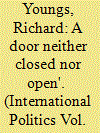

|
|
|
|
|
| Publication |
2009.
|
| Summary/Abstract |
Ukraine provides evidence of very different Common Foreign and Security Policy negotiating dynamics. In the run up to the country's Orange Revolution, significant differences persisted between member states over how the European Union (EU) should support Ukraine's democratic transition. A combination of normative entrapment and co-operative bargaining ensured that 'maximalist' and 'minimalist' member states united around a common position in support of the Orange Revolution. In subsequent debates over whether the EU should offer Ukraine a membership prospect, however, lowest common denominator dynamics prevailed. This case additionally demonstrates that both before and after Ukraine's democratic transition very specific external geostrategic factors played an important role in conditioning EU policy outcomes
|
|
|
|
|
|
|
|
|
|
|
|
|
|
|
|
| 2 |
ID:
088480
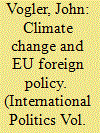

|
|
|
|
|
| Publication |
2009.
|
| Summary/Abstract |
The European Union has established itself as the leader of attempts to construct a global climate change regime. This has become an important normative stance, part of its self-image and international identity. Yet it has also come to depend on the Union's ability to negotiate internally on the distribution of the burdens necessitated by its external pledges to cut emissions. The paper considers institutionalist hypotheses on cooperative bargaining and normative entrapment in EU internal negotiations before the 1997 Kyoto Protocol negotiations and the more recent approach to negotiations on a post-2012 regime. It finds that there is evidence to support the normative entrapment hypothesis in both cases, but that agreement in 1997 was facilitated by a very favourable context associated with a 1990 baseline.
|
|
|
|
|
|
|
|
|
|
|
|
|
|
|
|
| 3 |
ID:
088476
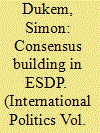

|
|
|
|
|
| Publication |
2009.
|
| Summary/Abstract |
This paper examines how EU Member States reach agreement in the area of European Security and Defence Policy, including how differences are resolved and priorities aligned. The case study, Operation Artemis conducted in the Democratic Republic of the Congo in 2003, is used to test the key explanatory hypotheses of normative institutionalism. It is argued that normative entrapment played a significant role, although the cooperative bargaining aspects were significantly modified in this case by the awareness that one larger EU Member State was willing to assume the bulk of the burdens.
|
|
|
|
|
|
|
|
|
|
|
|
|
|
|
|
| 4 |
ID:
088477
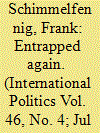

|
|
|
|
|
| Publication |
2009.
|
| Summary/Abstract |
The membership of Turkey is one of the most controversial external relations issues of the European Union (EU). In a comparison of four instances of decision-making on accession negotiations with Turkey between 1997 and 2006, this paper explains why and under which conditions Turkey has progressed on the way to EU membership in spite of persistent and increasing divergence of membership preferences. In line with the entrapment hypothesis of normative institutionalism, the analysis shows that Turkey and its supporters within the EU have been able to overcome the opposition to its membership bid to the extent that Turkey followed the fundamental norms of the EU.
|
|
|
|
|
|
|
|
|
|
|
|
|
|
|
|
| 5 |
ID:
088478
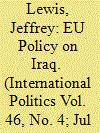

|
|
|
|
|
| Publication |
2009.
|
| Summary/Abstract |
At first glance, Europe's discord over the US-led invasion of Iraq in 2003 was a foreign policy debacle. And when a majority of Member States publicly broke ranks with a tenuously reached common position, skeptics argued that the EU's consultative and consensus-based process of foreign policy making was either fictitious or irrevocably broken. But in fact, the Iraq crisis triggered a normative reframing of security and defense policy and renewed a commitment to consensus decision making. Rather than a lowest common denominator outcome, a compromise position was reached in the form of EU-coordinated economic and humanitarian assistance to rebuilding Iraq that has exceeded 200 million euros per year since 2004. This was possible because normative commitments to develop the EU as a global actor and to promote democracy and the rule of law worldwide legitimated EU action and constrained Member States with 'do nothing' and/or 'let the UN do it' preferences. The foreign ministers' ability to reach agreement on coordinated recon aid to Iraq also displays the Union's principled commitment to make decisions in a norm-governed and consensus-based institutional environment of cooperative bargaining.
|
|
|
|
|
|
|
|
|
|
|
|
|
|
|
|
| 6 |
ID:
088473
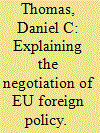

|
|
|
|
|
| Publication |
2009.
|
| Summary/Abstract |
Despite the vast literature on the development of EU foreign policy institutions and the EU's growing experience as an international actor, relatively little effort has been made to explain the often-contentious negotiations among Member States that determine whether or not a common policy is adopted, and if so, what it will be. This paper proposes a Normative Institutionalist theory of intra-EU negotiations on foreign policy and external relations, including hypotheses that explain policy outcomes in terms of entrapment and cooperative bargaining dynamics. It compares these hypotheses' causal mechanisms and observable implications to those of hypotheses derived from Intergovernmentalism as well as theories of Social Learning and Normative Suasion.
|
|
|
|
|
|
|
|
|
|
|
|
|
|
|
|
| 7 |
ID:
088481


|
|
|
|
|
| Publication |
2009.
|
| Summary/Abstract |
Normative Institutionalism has proven to be a robust theory of EU decision-making on foreign policy and external relations whose entrapment and cooperative bargaining explanations for the policy-making process and outcome are generally (though not universally) superior to those of competing theories. This conclusion emerges from 14 case studies across a broad range of policy areas and institutional settings, all of which exhibited clear differences in the initial policy preferences of member states. Only two of the cases offered clear support for Intergovernmentalism's competitive bargaining hypothesis, while none of the case studies conforms to either the normative suasion or policy learning hypotheses, which posit distinctive mechanisms of policy agreement based on preference convergence. Cross-case analysis identifies the relative importance of five conditions hypothesized to affect the likelihood of entrapment and cooperative bargaining: determinacy, relevance, publicity, precedent and forum. Finally, we discuss the implications of this special issue for future research and for EU policy-making
|
|
|
|
|
|
|
|
|
|
|
|
|
|
|
|
| 8 |
ID:
088475


|
|
|
|
|
| Publication |
2009.
|
| Summary/Abstract |
Achieving European Union (EU) unity in world affairs is particularly difficult when divergent Member State preferences are reinforced by US pressure. This paper explains how the EU maintained unity on the International Criminal Court (ICC) despite a concerted American effort in 2002 to exploit intra-EU discord on the issue of agreements to shield citizens from certain states from ICC scrutiny. Some Member States were sympathetic to American efforts to shield US personnel from the ICC, while others considered them incompatible with the EU's prior commitment to support the new Court. By comparing the process and outcome of two sets of negotiations on this issue, one within the UN Security Council and one within EU forums, the paper suggests that the likelihood of EU policy outcomes being shaped by prior normative commitments and cooperative bargaining (as expected by Normative Institutionalism) rather than competitive bargaining (Intergovernmentalism) depends significantly upon the institutional context in which the Member States negotiate.
|
|
|
|
|
|
|
|
|
|
|
|
|
|
|
|
| 9 |
ID:
088479
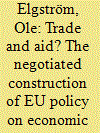

|
|
|
|
|
| Publication |
2009.
|
| Summary/Abstract |
Efforts by the European Commission and by leading member states, to normatively frame the debate about trade - and thus rhetorically entrap other actors by references to previous commitments - are ubiquitous; and member states do take account of the potential effects of their actions, in terms of potential praise or shaming, and adapt their behaviour to the institutional setting. However, this holds true only up to a certain limit. If sensitivity to domestic constituencies is high enough and the issue gets politicized, then member states may break ranks regardless of institutionalized normative constraints, especially if the issue-area is linked to proclaimed key self-images of the government. External pressure can also play its part. Indeed, the Commission's reluctant decision to include development sections in the final offer was arguably not only the result of internal member state activity, but also of pressure from the EU's counterpart - Africa, the Caribbean and the Pacific - whose main bargaining objective was to include strong and effective development provisions in the final agreement.
|
|
|
|
|
|
|
|
|
|
|
|
|
|
|
|